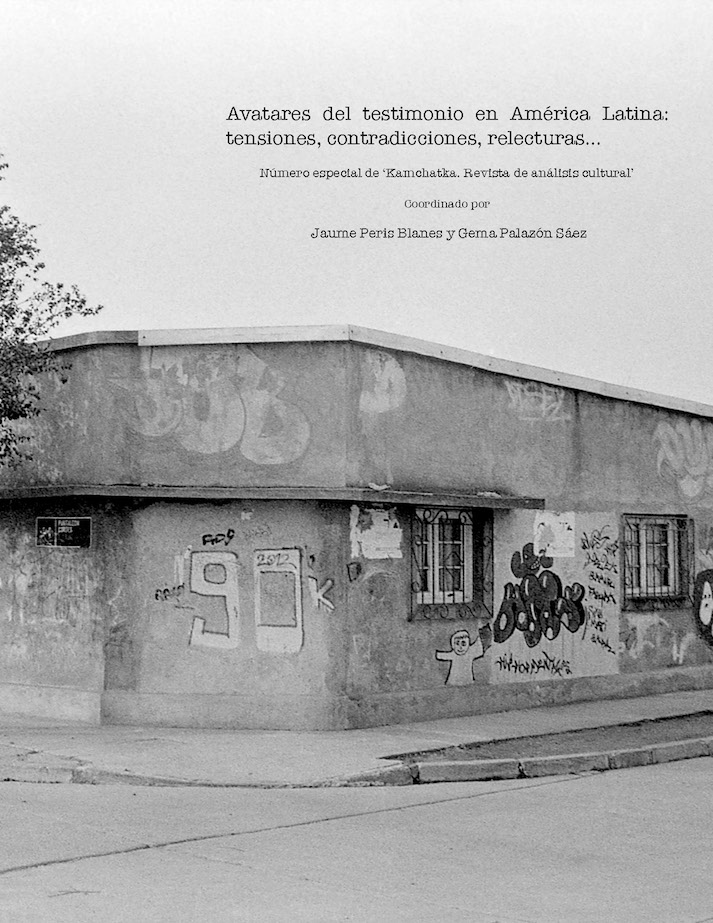Testimonios indígenas conosureños: ¿convivencias excluyentes?
DOI:
https://doi.org/10.7203/KAM.6.7194Keywords:
testimonio, literatura testimonial, América Latina, pueblos indígenas, testimonio indígena Abstract
Abstract
Resumen: El presente artículo, partiendo de lapremisa de que la teoría del testimonio en AméricaLatina fue construida a partir de textos testimonialesdel área centroamericana y caribeña sobre la base deun trasfondo marxista, revisa de manera panorámicatestimonios de cuatro culturas indígenas deSudamérica (quechua, aymara, mapuche y yagán)resaltando la dimensión cultural contenida en estos.Se caracterizan tanto las condiciones de producciónde estos testimonios como también las formas deconvivencia que estos representan. Las exclusionesque padecen los testimoniantes por parte de susrespectivas sociedades se interpretan comoconsecuencia de la idea ilustrada de progreso que guiola construcción de naciones en el siglo XIX. Pese aello, los textos dan a conocer un Cono Sur polilógico.
Palabras clave: testimonio, indígenas, Cono Sur,convivencia, exclusiones
Abstract: The present article begins with the premisethat the theory of testimonio in Latin America wasconstructed based on testimonial texts from CentralAmerica and the Caribbean and with a Marxistunderpinning. This article will examine thetestimonies of four indigenous cultures of SouthAmerica (Quechua, Aymara, Mapuche and Yaghan),highlighting the cultural dimension of each one, whileat the same time characterizing the conditions ofproduction as well as the social coexistence that theyrepresent. The exclusions those who testify suffer intheir respective societies are interpreted as aconsequence of the Enlightenment idea of progressthat guided nation building in the 19th Century. Inspite of this, the texts illustrate a polylogical SouthernCone.
Key words: testimonio, indigenous peoples, SouthernCone, social coexistence, exclusions
 Downloads
Downloads
 References
References
Bibliografía citada: Augusta, Félix José de (1910). Lecturas araucanas (narraciones, costumbres, cuentos, canciones, etc.). Valdivia: Imprenta de la Prefectura Apostólica (con la cooperación de Fray Sigifredo de Frauenhaeusl). Barnet, Miguel ([1966] 2001). Biografía de un cimarrón. La Habana: Editorial Letras Cubanas. Beverley, John (1996). “The Real Thing”. Gugelberger, Georg M. (ed.) The Real Thing. Testimonial Discourse and Latin America. Durham / London: Duke University Press: 266-286. Beverley, John y Achugar, Hugo (directores) (1992). Revista de Crítica Literaria Latinoamericana. La voz del otro: testimonio, subalternidad y verdad narrativa. Año XVIII, N° 36, 2do Semestre. Lima / Pittsburgh: Latinoamericana Editores. Briggs, Lucy T. y Dedenbach-Salazar Sáenz, Sabine (eds.) (1995). Manuela Ari: an aymara woman’s testimony of her life (Text in Aymara, Englisch und Spanisch). Bonn: Bonner Amerikanistische Studien. Burgos, Elisabeth (1983). Me llamo Rigoberta Menchú y así me nació la conciencia. La Habana: Casa de las Américas. Cornejo Polar, Antonio (1994). Escribir en el aire. Ensayos sobre la heterogeneidad socio-cultural en las literaturas andinas. Lima: Editorial Horizonte. Ette, Ottmar (2012). “Vorwort”. Ette, Ottmar (Hrsg.) Wissensformen und Wissensnormen des Zusammenlebens. Literatur – Kultur – Geschichte – Medien. Berlin / Boston: Walter de Gruyter: V-VII. Ette, Ottmar (2010). ZusammenLebensWissen. List, Last und Lust literarischer Konvivenz im globalen Maßstab (ÜberLebenswissen III). Berlin: Kulturverlag Kadmos. Espinoza, Darío (recopilador) (1997). Testimonio. Ciprian Phuturi Suni. Tanteo puntun chaykuna valen. Las cosas valen cuando están en su punto de equilibrio…. Lima: CHIRAPAC. Fernández, Hans (2012). De migrantes, cuentistas, abigeos y cantores. El enfoque culturalista en los testimonios andinos «Gregorio Condori Mamani» y «Nosotros los humanos».Berlin: Logos Verlag. Figueroa, Luis (1974). El cargador. Perú: Perucinex S. A. Foote, Susan A. (2012). Pascual Coña: Historias de sobrevivientes. La voz en la letra y la letra en la voz. Concepción: Editorial Universidad de Concepción. Gugelberger, Georg M. (ed.) (1996). The Real Thing. Testimonial Discourse and Latin America. Durham / London: Duke University Press. Guzmán G., Gastón (2009). Toribio Bartolo. Testimonio de un aymara / Toribio Bartolo Qamañapa. Santiago de Chile: Pehuén Editores. Mallon, Florencia E. (edición y presentación) (2002). Una flor que renace. Autobiografía de una dirigente mapuche. Rosa Isolde Reuque Paillalef. Santiago de Chile: DIBAM / Centro de Investigación Barros Arana. Moesbach, Ernesto Wilhelm de. ([1930] 2006). Lonco Pascual Coña ñi tuculpazugun. Testimonio de un cacique mapuche. Santiago de Chile: Pehuén Editores. Montecino, Sonia (1999). Sueño con menguante. Biografía de una machi. Santiago de Chile: Editorial Sudamericana. Sklodowska, Elzbieta (1992). Testimonio hispanoamericano. Historia, teoría, poética. New York / San Francisco / Bern / Baltimore / Frankfurt am Main / Berlin / Wien / Paris: Peter Lang. Štambuk M., Patricia (2007). El zarpe final. Memorias de los últimos yaganes. Santiago de Chile: LOM Ediciones. Štambuk M., Patricia (1986). Rosa Yagán, el último eslabón. Santiago de Chile: Editorial Andrés Bello. Valderrama Fernández, Ricardo y Escalante Gutiérrez, Carmen (1992). Nosotros los humanos. Ñuqanchik Runakuna. Testimonios de los quechuas del siglo XX. Cusco: Centro de Estudios Regionales Andinos “Bartolomé de las Casas”. Valderrama Fernández, Ricardo y Escalante Gutiérrez, Carmen (1977). Gregorio Condori Mamani. Autobiografía. Cusco: Centro de Estudios Rurales Andinos “Bartolomé de las Casas”. Viezzer, Moema ([1977] 1980). ‘Si me permiten hablar...’ Testimonio de Domitila, una mujer de las minas de Bolivia. México: Siglo XXI. Zevallos Aguilar, Juan. “A propósito de Andean Lives, Gregorio Condori Mamani y Asunta Quispe Huamán. Apuntes sobre la hipercanonización y negligencias de la crítica del testimonio”. Revista de crítica literaria latinoamericana. Año XXIV, N° 48 (1998): 241-248.
Downloads
Published
How to Cite
-
Abstract2338
-
Artículo (Español)833
Issue
Section
License
This journal provides an immediate free access to the content on the principle that freely make investigation available to the public, which promotes an increased global knowledge exchange.
Unless otherwise indicated, texts published in this journal are under the license Attribution-NonComercial 4.0 by Creative Commons. These texts may be copied, distributed and publicly communicated whenever the publication’s author and title are quoted and whenever they are not used for commercial purposes. In any case, intellectual property of the articles and its potential economic rights entirely belong to its authors.
The full license can be consulted on https://creativecommons.org/licenses/by-nc/4.0/. We encourage authors to disseminate papers published in Kamchatka. Journal of cultural analysis electronically, in institutional digital repository or in their websites.





